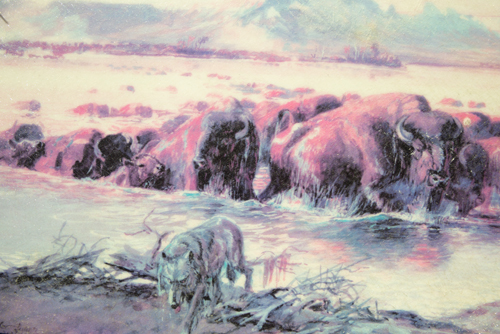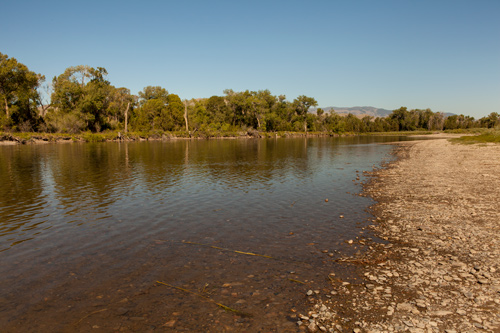At the Great Falls of the Missouri, Lewis has the iron-framed boat and the carriage wheels for portaging canoes removed from their caches. Wet trunks and items are placed on scaffolds to dry and wolves continually howl around them.
Moving by horse up the Gallatin River valley, Clark and his group mire in swamps from numerous beaver dams. Sacagawea knows of a road through the valley, and they soon find an old bison trace to follow.
Paddling down the Missouri, Sgt. Ordway and his group are delayed by high winds. They camp near Yorks Islands south of present Townsend, Montana.[1]For more on the captains’ strategy and various groups after leaving Travelers’ Rest, see Dividing Forces at Travelers’ Rest.
Iron-framed Boat in Good Shape
by Yellowstone Public Radio[2]Originally aired weekdays by Yellowstone Public Radio during the Bicentennial observance of 2003-2006. Narrated by Hal Hansen. Scripts by Whit Hansen and Ed Jacobson. Produced by Leni Holliman. © … Continue reading
Lewis Digs Out Caches
Wheels and Iron-framed Boat
Had the carriage wheels dug up found them in good order. the iron frame of the boat had not suffered materially.
—Meriwether Lewis
Cous Meal
had the meat cut thiner and exposed to dry in the sun. and some roots of cows [Cous Root] of which I have yet a small stock pounded into meal for my journey. I find the fat buffaloe meat a great improvement to the mush of these roots.
—Meriwether Lewis
Scaffolding the Trunks
the old cash being too damp to venture to deposit my trunks &c in I sent them over to the Large island and had them put on a high scaffold among some thick brush and covered with skins. I take this precaution lest some indians may visit the men I leave here before the arrival of the main party and rob them.
—Meriwether Lewis
Numerous Wolves
the wolves are in great numbers howling arround us and loling about in the plains in view at the distance of two or three hundred yards. I counted 27 about the carcase of a buffaloe
—Meriwether Lewis
Sacagawea Knows a Way (Clark)
Swamped by Beavers
Swamped as I may Say in this bottom of beaver I was compelled to turn Short . . . . the Squar [Sacagawea] informed me that there was a large road passing through the upper part of this low plain from Madicins river through the gap which I was Stearing my Course to . . . . Struck an old buffalow road [Nicholas Biddle: the one our Indn woman meant] which I kept
—William Clark
Fur Trade Prospects
emence quantities of beaver on this Fork quit down, and their dams very much impeed the navigation of it from the 3 forks down, tho I beleive it practicable for Small Canoes by unloading at a fiew of the worst of those dams.
—William Clark
Missouri River at Yorks Islands
© 23 July 2013 by Kristopher K. Townsend. Permission to use granted under the Creative Commons Attribution-Share Alike 4.0 International license.
Ordway Fights Headwinds
a fair morning. we took an eairly breakfast and proceeded on down the river . . . . the wind rose So high that we were unable to proceed. So two hunters went out a hunting . . . . in the evening as the wind fell we mooved down the R. to a bottom and Camped.
—John Ordway
Weather Diaries
State of the weather at rise
Wind at rise
State of the weather at 4 P. M. Wind at 4 P. M. fair S W fair S W —Meriwether Lewis
State of the weather at Sun rise Wind at Sun rise State of the weather at 4 P. M Wind at 4 P M. fair N W fair N W Saw a Tobaco worm shown me by York
—William Clark[3]To assist the reader of this web page, the date column is omitted and some abbreviations have been spelled out.
The Great Falls Portage is a High Potential Historic Site along the Lewis and Clark National Historic Trail managed by the U.S. National Park Service. It includes Sulpher Spring (open to the public) and Lower Portage Camp site (private land), and the Upper Portage Camp Overlook.
Notes
| ↑1 | For more on the captains’ strategy and various groups after leaving Travelers’ Rest, see Dividing Forces at Travelers’ Rest. |
|---|---|
| ↑2 | Originally aired weekdays by Yellowstone Public Radio during the Bicentennial observance of 2003-2006. Narrated by Hal Hansen. Scripts by Whit Hansen and Ed Jacobson. Produced by Leni Holliman. © 2003 by Yellowstone Public Radio. |
| ↑3 | To assist the reader of this web page, the date column is omitted and some abbreviations have been spelled out. |




